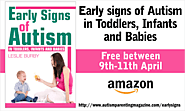-
About
- About Listly
- Community & Support
- Howto
- Chrome Extension
- Bookmarklet
- WordPress Plugin
- Listly Premium
- Privacy
- Terms
- DMCA Copyright
- © 2010-2025 Boomy Labs

Listly by Autism Parenting Magazine
In April 1970, the Autism Society celebrated the first Autism Awareness Month. During this month, the American public is encouraged to further educate themselves on autism, how to recognize the early warning signs, and support research efforts. Events are held nationwide and range from celebrations of the diversity of people with autism to public education seminars.
Download our FREE guide at:
https://www.autismparentingmagazine.com/promote-autism-awareness/
Source: https://www.autismparentingmagazine.com/promote-autism-awareness/

In April 1970, the Autism Society celebrated the first Autism Awareness Month. During this month, the American public is encouraged to further educate themselves on autism, how to recognize the early warning signs, and support research efforts. Events are held nationwide and range from celebrations of the diversity of people with autism to public education seminars.

April is Autism Awareness Month and there are always a variety of different events happening to raise awareness. We have “Light it up Blue” on April 2nd where businesses light up blue for awareness. We have a multitude of walks, runs, and sporting events that are all being held to raise awareness. All of these things are absolutely wonderful and they do raise awareness and funding for autism.

A head teacher giving a high-five to a little girl with autism and hunching down to chat to her at length—that’s inclusion. A teenage boy who feels confident to share some information with his classmates about his autism diagnosis—that’s inclusion. An autistic girl who is given a central role in a class assembly, even though she may decide to opt out at the last minute—that’s inclusion too.

I did something that I rarely ever do this month; I watched TV. One night my husband and I decided to not work and sat down on the TV in hopes to find something to watch. He settled on Dancing with the Stars so I sat and watched in revelry missing the days that I used to dance. One woman caught my eye with her beautiful smile and angelic face, as she waited for her turn to dance to Derek. I had never seen her before but she was one of the “stars.” Later they showed a commercial of a woman winning the Paralympics and as I took a closer look I realized it was the angelic woman that had caught my attention earlier. Then the show went on to show her meeting her dancing coach Derek and showing him that she has two prosthetic legs and feet from bacterial meningitis. When she, Amy Purdy, danced everyone held their breath. When she was done dancing, eyes were filled with tears, hearts soared with happiness and everyone was in awe of this woman’s courage and dedication to not let anything stop her. She astounded but even more than that was my shock at how people are able to sympathize with her because they can see her struggle. I sat their wondering what if people could sympathize or hold their breath long enough to wonder what a struggle it is for autistic persons when they are met with something like small talk or a job interview? Just imagine if people were kind enough and thoughtful enough or maybe I should say were aware enough to consider the difficultness of verbal and social skills that come easy to most Neuro-typicals? Or perhaps what if people could visibly see sensory struggles? I am not saying people should wait to the day when they can see it to show respect of it. What I am saying is that ALL people, should be respected, accepted and loved. We all have different abilities, different struggles, different strengths, different weakness- my hope is one day we stop measuring abilities against each other and embrace our uniqueness and help each other with our struggles.

Fighting for Autism is a global, nonprofit organization with many divisions proudly working with children, families, and communities to bring autism awareness and inclusion amongst different cultures. It is designed to improve the quality of life for children and adults living with autism through multiple divisions including Fighting For Autism, Fitness For Autism, and Racing For Autism.

It’s no secret I’ve been struggling with my son’s delays. Every day I think about it, I think about what the world will be like for him in the future. I think about the journey for our family. I often wonder if he loves me as much as I love him…he doesn’t have the words to say it, but deep down his hugs seem real enough to make me believe there’s hope…

Autism can be one of the most difficult diagnoses to accept for parents. This is particularly due to the challenging symptoms associated with autism spectrum disorder. As with many things that society does not understand, autism has a certain stigma attached to it, too. This can make it quite difficult for families struggling to cope with an individual who has the diagnosis.

Paramedics do amazing things every day; I know because I used to be one. They are often the first responders on the scene of a collision, fire, workplace accident or even a natural disaster. In addition to attending to the urgent medical needs of those on the scene, they are also charged with identifying their patients for notification purposes. The combination of figuring out how to treat a complete stranger properly, and how to contact their loved ones can present a host of complicated challenges.

A couple of months ago we published a book written by Editor Leslie Burby. It details how parents can identify the early signs of Autism in their children. So far it has received some great reviews from its readers.

Encouragement speaker Derrick Hayes gives an AUTISM interview by asking six questions through each letter in the word AUTISM to give readers an insightful perspective from parents, experts, entrepreneurs, and other leaders in the field.
